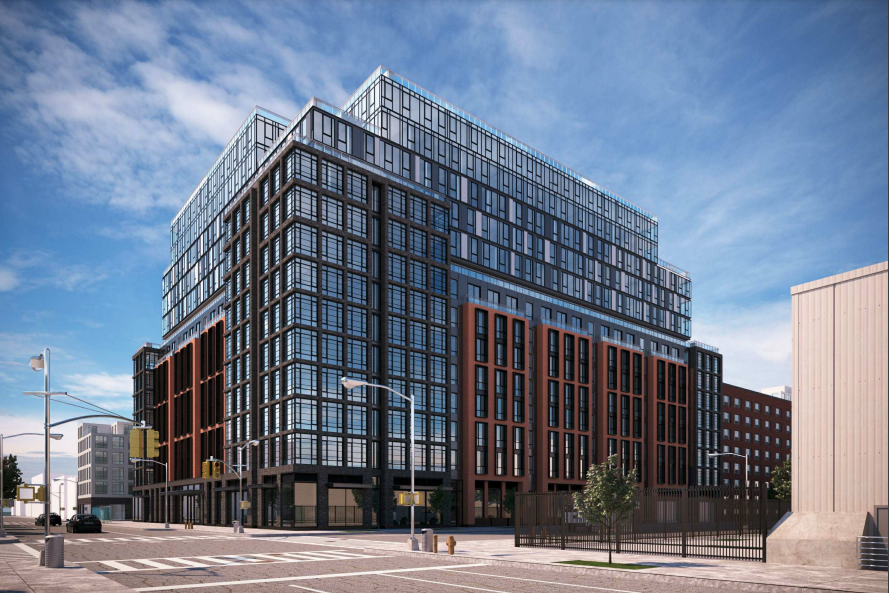Bed-Stuy Community Board Seeks Compromise in Rezoning Former Nursing Home Site


A developer wants to build a 14-story mixed-use building at the site of a former Bed-Stuy nursing home owned by a controversial healthcare provider. The local community board has questions.
BRP Companies has filed a rezoning request for 270 Nostrand Avenue between Dekalb Avenue and Kosciuszko Street. In the application, BRP identified itself as the “contract vendee” of the site.
The site’s owner, however, is NNRC Properties LLC, a subsidiary of the Allure Group healthcare chain, which became infamous in 2016 when it closed a nursing home at the site and another – the Rivington House – on the Lower East Side, leading to lawsuits and a settlement with the state Attorney General.
BRP is asking the city to change the site’s zoning from R7A to R8A/C2-4, in order to build a 14-story building with 487 rental apartments and ground-floor retail. The proposed development also calls for just under 1,130 of “community facility” space and 176 parking spaces on the first floor and mezzanine, as well as an interior courtyard.
Under the city’s Mandatory Inclusionary Housing program, 144 of the apartments would be designated affordable.
Tenants in other BRP developments, including Brooklyn Legal Services and ParCare Community Health Network, have written letters of support for the project.
But members of the land use committee of Brooklyn Community Board 3, which represents the area, have concerns about the proposed building’s height, and about whether the proposed affordable units would be sufficiently affordable for the neighborhood’s residents.
“Rents were too high, and the incomes were too high,” committee chair Cynthia Doris Pinn said of the proposal at a virtual meeting Wednesday night.
Pinn said she and other board members had met with local Council Member Robert Cornegy the day before to discuss a compromise that would instead change the zoning designation to R7D, the tallest currently permitted in the area, which would limit the building’s height to 10 stories. (A nearby 12-story, 135-foot-tall building at Kosciuszko Street was constructed in 2011, before height limits were imposed as part of an area-wide rezoning in 2012.)
Granting the taller zoning request, Pinn said “would be opening up a pandora’s box” of future rezoning requests from on other nearby properties.

Committee members also want to lower the upper limits of the proposed rent and income ranges of the affordable units to be, as Pinn said, “more in line” with existing rents in the area. And Pinn suggested that the developer take advantage of another available zoning incentive that would enable them to build slightly taller in exchange for putting a supermarket on the ground floor.
Pinn said Cornegy would present the compromise proposal to BRP for review, but it’s not clear if that conversation has happened yet. Cornegy did not respond to a request for comment by press time.
Community boards serve only an advisory role in rezoning proposals, but the City Council’s vote is binding. Traditionally, the Council defers to the opinion of the member representing the area in question (though that tradition has come under some scrutiny in recent years), making Cornegy’s decision crucially important.
Even if a rezoning is not approved, the owners would still be able to build a seven-to-nine story building at the site, with no affordable housing set-asides required.

The exact nature of the agreement between BRP and Allure, which did not return a request for comment, is not entirely clear. In an emailed statement, a spokesperson for BRP said it did not own the property but currently has “site control.”
“Our intention has always been to work together with the community and all public parties to develop high-quality workforce housing that enhances the neighborhood without using scarce public subsidies,” the BRP spokesperson said. “We have presented and discussed our plans for the site with the Community Board and the local elected officials in good faith, and will continue to be committed to the Affordable New York program,” referring to the state tax incentive program.
The spokesperson said Allure would eventually “transfer” ownership to BRP, though they did not specify when or how that transaction would occur.
The location was the home of CABS Nursing Home Company starting in 1973. In 2009, the facility began operating at a loss, and CABS began to look for a buyer who would continue to operate the nursing home.
NNRC Properties LLC, which is controlled by Allure, bought the property from CABS for $15.6 million in June 2015. But rather than continue to operate the nursing home, Allure moved its patients to other facilities and filed construction permits for a seven-story residential development at the site.
CABS then sued, claiming Allure lied about plans to keep the nursing home open. They sought to rescind the sale and regain control of the property while asking for over $30 million in damages. Allure was accused of similar misconduct in a high-profile case involving the Rivington House nursing home in Manhattan.
Then-State Attorney General Eric Schneiderman issued subpoenas, and the city’s Department of Buildings issued a stop-work order at the site.
CABS’ fraud claims were dismissed in 2017. But in 2018, the state Attorney General and Allure reached a settlement that required Allure to pay $1.25 million to healthcare nonprofits and $750,000 to the state. Allure was also required to make improvements to its Greater Harlem Nursing Home, and to open new facilities in Brooklyn and Manhattan to compensate for the services lost when CABS and Rivington House shuttered. The stop work order was later rescinded, and the old building was demolished in 2018.

Meanwhile, the property at 270 Nostrand Avenue has been mostly demolished. Department of Buildings records indicate a $25,000 fine for failing to properly conduct the demolition, levied in 2019, has not been paid. The BRP spokesperson said Allure would pay the outstanding fine.





